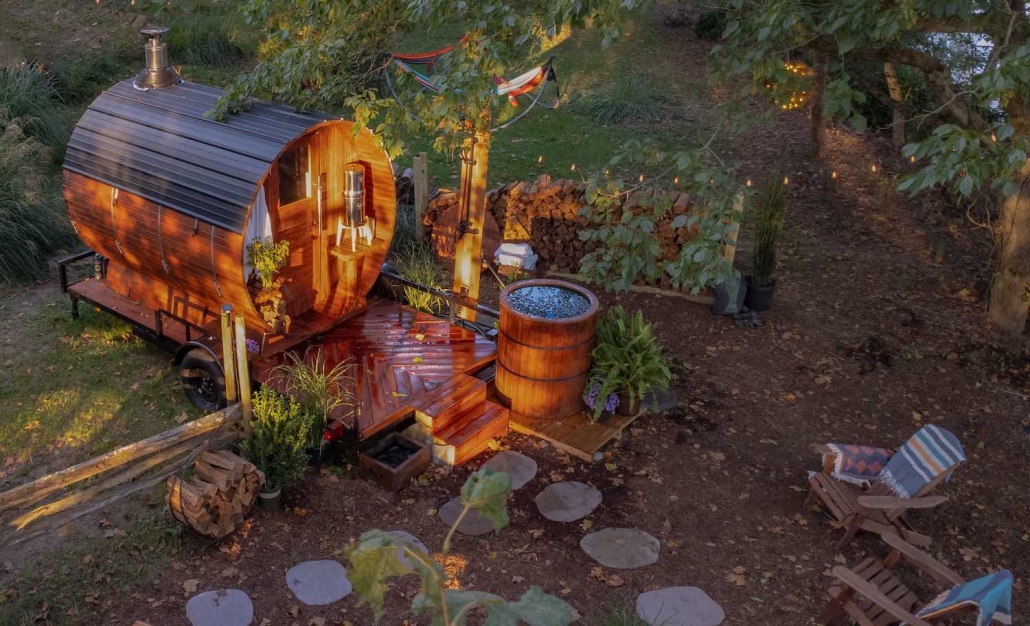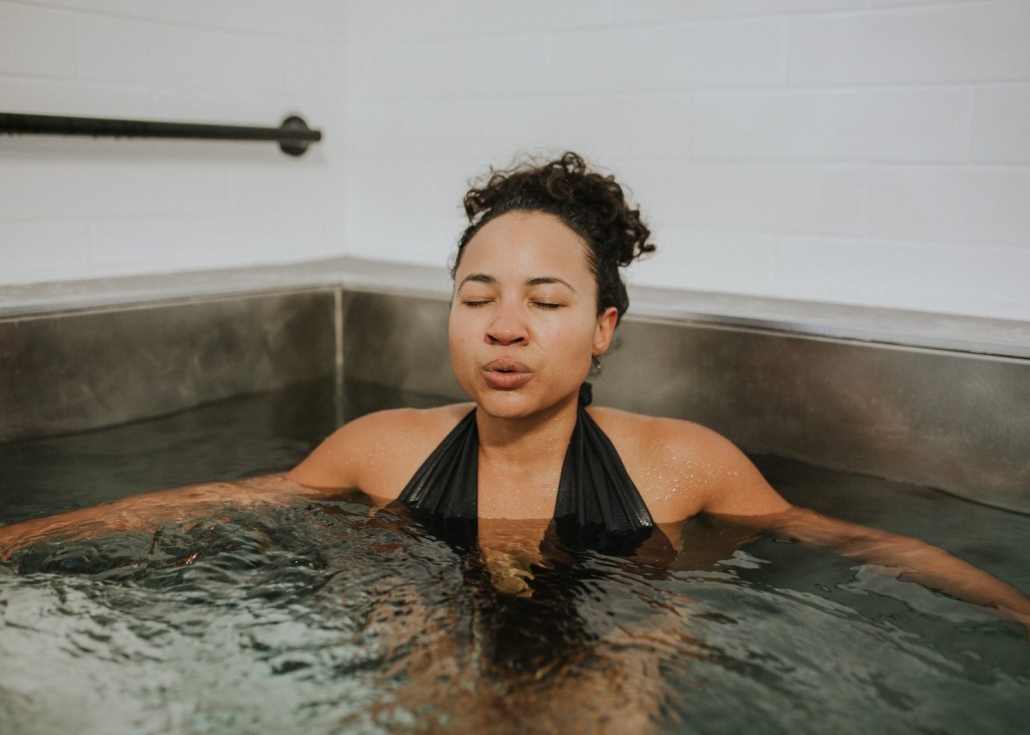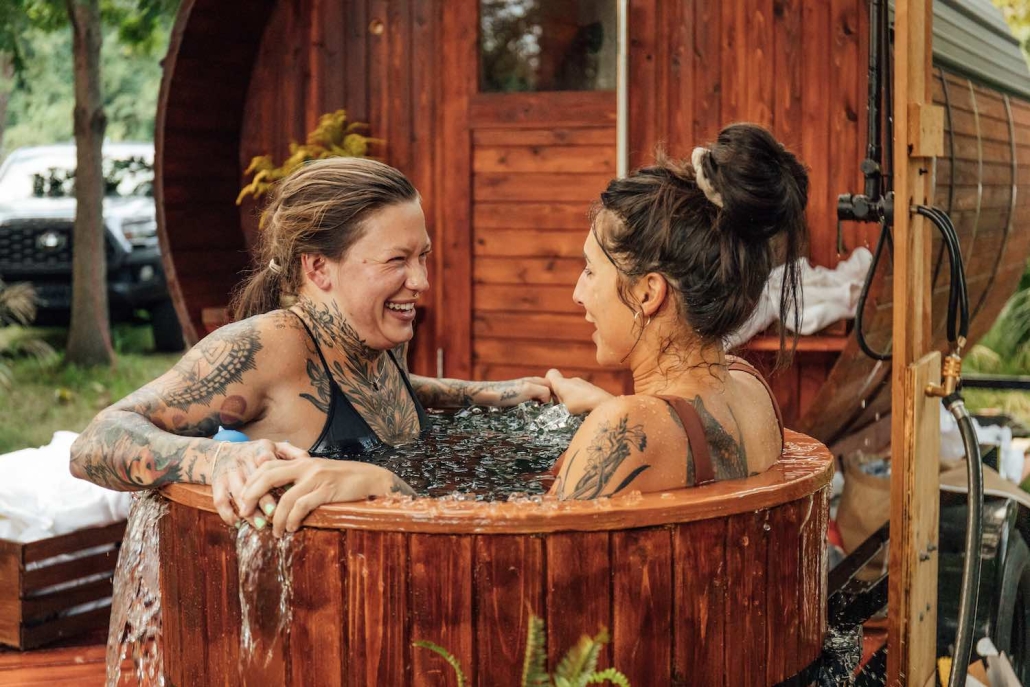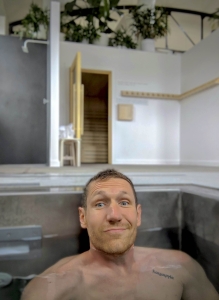LEARNING TO CHILL
Cold plunges can have hot health benefits
WORDS BY TOMMY DOTT
***
“The treatment changed my breathing,” McKelvy says. “Between the sauna and cold plunge, I felt calmer. Stress and anxiety washed away in the cold water. I was hooked.”

A mobile sauna and cold-water plunge bath in WNC.
McKelvy and Headford are now part of a growing wave of fans of this so-called contrast therapy and its ability to improve both the body and mind. And the trend seems to be taking root particularly fast in Western North Carolina, a region known as a destination for health and healing.
In and of themselves, cold plunges can be beneficial. Ideally in waters cooler than 50°F—in a lake, river or bathtub filled with cold water or ice—a cold plunge usually lasts a relatively short amount of time, ranging from 30 seconds to 10 minutes. Doctors have recognized plunges for their ability to reduce inflammation and soreness, which makes them particularly popular among athletes and others engaged in vigorous exercise.
When the friend found relief with cold water therapy, he encouraged Lachlan to give it a try, perhaps as a way to address his own set of challenges, including sleep apnea and inflammation.
“He challenged me, in the dead of winter, to 30 days of cold showers or cold plunge,” Lachlan says. It worked. After about 45 seconds of “searching for curse words and wriggling around like a worm on asphalt,” Lachlan’s equilibrium had been restored. “Breathing deeply into my stomach, I could relax and welcome the cold in. Time slowed down, and relaxation set in. When I got out, my shoulders were purple. I was shivering, humbled, but proud I didn’t give up.”

A guest at Sauna House in Asheville.
In 2019, Lachlan launched the popular Nordic-style Sauna House in Asheville’s South Slope, which offers a signature “hot-cold-relax” experience and, along with a team headed by Lachlan and COO Jen Richter, has recently become a successful franchise.
The practice of using cold water as a healing remedy can be traced back to ancient Egyptian, Greek and Roman cultures. But the modern-day hydrotherapy movement started in the 17th century, when physicians began experimenting with water temperatures and the effects of varying temperatures on their patients—an effort that is still ongoing today.
According to H. Craig Heller, a biology professor at Stanford University who has done research on the benefits of icy waters, “the major cause of muscle fatigue and failure is a rise in muscle temperature, and heat extraction leads to rapid recovery and continued work capacity.”
Cold water plunges are particularly popular in Nordic countries and seem to be tightly woven into their health cultures. In Denmark, for example, there are about 185 winter bathing clubs with over 70,000 members. Danes view winter bathing as a way to stay healthy, embrace nature and gather with friends. In Finland, voted “the happiest country in the world” by the 2024 World Happiness Report, cold water immersion is a 300-year-old tradition, and many Finns celebrate its health benefits and the strong sense of community it brings.
Daniel Ratner and Evan Routzong, owners of Drip Nordic Sauna in Asheville, found the inspiration for their business in a shared appreciation for mountain hiking, which was often followed by frigid river swims.
Drip showcases three custom-built mobile saunas made from red cedar, Brazilian redwood and tigerwood, heated with wood-burning stoves, and then cold plunge barrels. When not delivered to events or gatherings, the movable saunas are parked in a peaceful retreat environment, complete with decks decorated with live flowers, fire pits and mountain views.
“We love the spiritual connection between guests while nurturing themselves in the saunas and barrels,” Ratner says excitedly.

Guests in the cold-water plunge baths at Drip Nordic.
Guests are encouraged to ladle water over the hot rocks of the saunas. The first steam that rises is Löyly (a Finnish word pronounced LOW-lu), said to release the spirit of the sauna. A dip in the cold barrel then provides the yin to the yang of the heat. “Heart rates rise in saunas,” Ratner explains. “Cold slows your heart rate. Your veins are like muscles. They expand in heat and retract in cold. Cold water helps build resilience and vascular strength, as it relaxes the heart rate.”
“It also just feels really good,” Routzong adds. “When you’re entering cold water, the natural response is to start breathing faster, but by slowing your breathing down you’re taking control of your cold response. You’re training your body to handle stressful moments with less tension and anxiety.”
Save
Save
Save
Save
Save
Save
Save
Save
Save
Save

Andrew Lachlan, founder of Sauna House in Asheville
THE WEEKLY REVEL
Sign up for your free handpicked guide to enjoying life around Asheville.
Available weekly from May to October.





